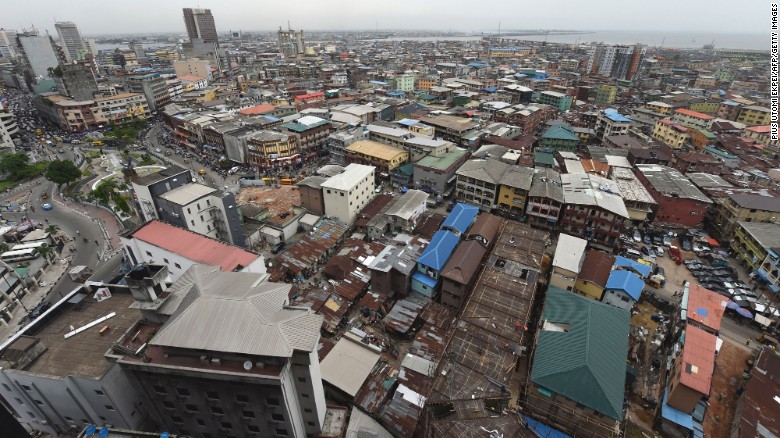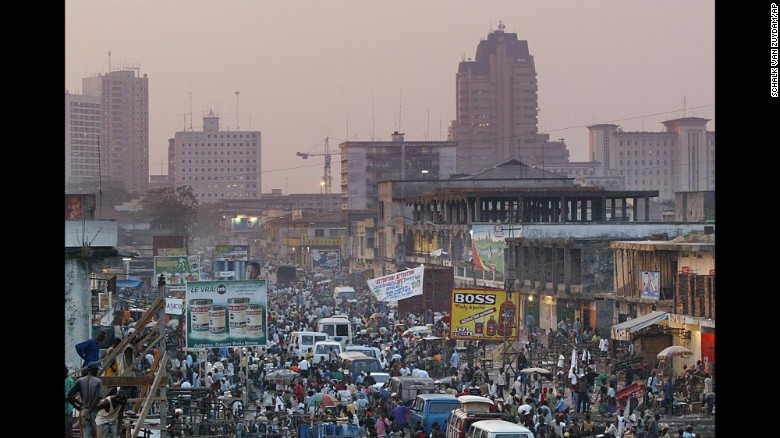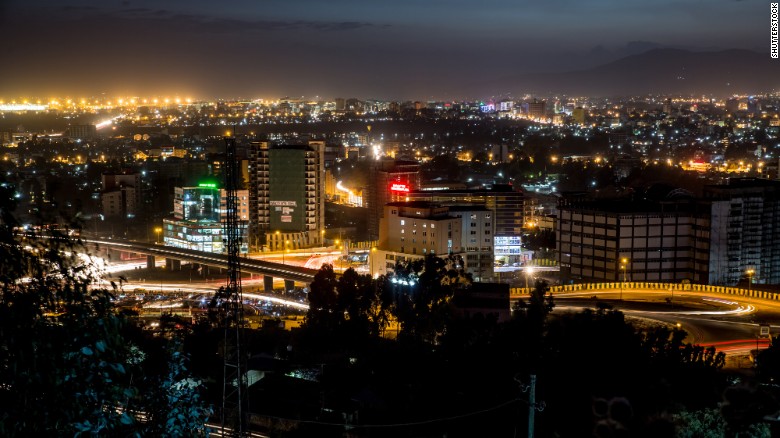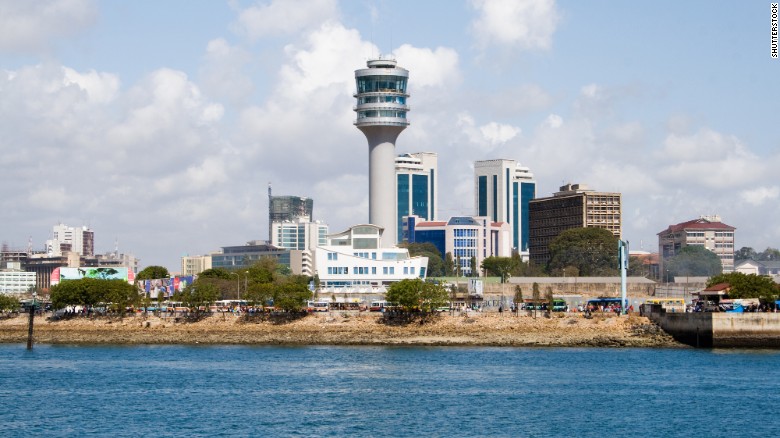Economic potential of African urban centers
6. Accra, Ghana – Accra was commended for its ease of doing business and GDP diversity. Poor rankings in healthcare and infrastructure let the city down, but with a stable political environment and a high ranking in terms of attracting foreign direct investment, analysts expect Accra to climb the rankings in the future.
Economic potential of African urban centers
7. Nairobi, Kenya – Nairobi came second only to Cairo when it came to international clout. The Kenyan capital was the top attraction for foreign direct investment and has a strong financial services industry, but shortcomings in infrastructure, healthcare and further education demonstrated room for improvement.
Economic potential of African urban centers
8. Lagos, Nigeria – High housing and business occupancy costs hindered Lagos, bringing down its infrastructure score. This is perhaps a result of its strong financial industry, with the Nigerian mega-city attracting substantial amounts of foreign investment and providing the headquarters for many Top 500 companies.
Economic potential of African urban centers
9. Addis Ababa, Ethiopia – Addis Ababa is experiencing a middle class explosion and boasts high diversity, while it topped the rankings in city scale. However, it had the worse GDP per capita and literacy rate of the cities assessed, while foreign investment is still in its infancy. But, ranking third overall in terms of infrastructure, analysts expect the investing situation -- and its ranking -- to improve.
Economic potential of African urban centers
10. Kampala, Uganda – Kampala founds its way into the top 10 off the back of one category: society and demographics. It had the highest ranked population growth, strong diversity and international clout -- fertile ground for a prosperous future workforce. GDP is growing at a steady rate and literacy rates are near the top. Limited infrastructure could be a barrier to future success.
Economic potential of African urban centers
1. Cairo, Egypt – A 2015 report by PwC ranked 20 African "Cities of Opportunity," looking at a number of factors, including infrastructure, human capital, economics and society and demographics. The Egyptian capital of Cairo topped the list thanks to its large scale, middle class and international clout, although analysts observed current political turmoil as a potential sticking point for investors.
Economic potential of African urban centers
2. Tunis, Tunisia – North African cities dominated the top five, with Tunis coming second. Analysts cited the city's top ranking health system and number of graduate enrollments, with Tunis trumping the rest of African urban centers in terms of human capital.
Economic potential of African urban centers
3. Johannesburg, South Africa – An anomaly among the top five, Johannesburg is both south of the Sahara and, having been founded in only 1886, is a relative newcomer. The South African city performed strongly in all main categories with the exception of society and demographics, where high crime, stagnating middle-class and overall population growth hindered the city.
Economic potential of African urban centers
4. Casablanca, Morocco – Casablanca triumphed in the hotly-contested economics index, coming first in GDP diversity and as a key location for Top 500 company headquarters -- top transport and energy infrastructure rankings no doubt helped in this sense. However, and like Tunis, the city was let down by poor diversity and population growth, typical of the North African cities surveyed.
Economic potential of African urban centers
5. Algiers, Algeria – Algiers was a high achiever in terms of human capital, with the second highest rate of graduates and an excellent health system. Its mid-table position in economics hindered its progress up the table, and while its middle-class numbers stagnate, crime levels were one of the lowest in Africa.
Economic potential of African urban centers
6. Accra, Ghana – Accra was commended for its ease of doing business and GDP diversity. Poor rankings in healthcare and infrastructure let the city down, but with a stable political environment and a high ranking in terms of attracting foreign direct investment, analysts expect Accra to climb the rankings in the future.
Economic potential of African urban centers
7. Nairobi, Kenya – Nairobi came second only to Cairo when it came to international clout. The Kenyan capital was the top attraction for foreign direct investment and has a strong financial services industry, but shortcomings in infrastructure, healthcare and further education demonstrated room for improvement.
Economic potential of African urban centers
8. Lagos, Nigeria – High housing and business occupancy costs hindered Lagos, bringing down its infrastructure score. This is perhaps a result of its strong financial industry, with the Nigerian mega-city attracting substantial amounts of foreign investment and providing the headquarters for many Top 500 companies.
Economic potential of African urban centers
9. Addis Ababa, Ethiopia – Addis Ababa is experiencing a middle class explosion and boasts high diversity, while it topped the rankings in city scale. However, it had the worse GDP per capita and literacy rate of the cities assessed, while foreign investment is still in its infancy. But, ranking third overall in terms of infrastructure, analysts expect the investing situation -- and its ranking -- to improve.
Economic potential of African urban centers
10. Kampala, Uganda – Kampala founds its way into the top 10 off the back of one category: society and demographics. It had the highest ranked population growth, strong diversity and international clout -- fertile ground for a prosperous future workforce. GDP is growing at a steady rate and literacy rates are near the top. Limited infrastructure could be a barrier to future success.
Economic potential of African urban centers
1. Cairo, Egypt – A 2015 report by PwC ranked 20 African "Cities of Opportunity," looking at a number of factors, including infrastructure, human capital, economics and society and demographics. The Egyptian capital of Cairo topped the list thanks to its large scale, middle class and international clout, although analysts observed current political turmoil as a potential sticking point for investors.
Economic potential of African urban centers
2. Tunis, Tunisia – North African cities dominated the top five, with Tunis coming second. Analysts cited the city's top ranking health system and number of graduate enrollments, with Tunis trumping the rest of African urban centers in terms of human capital.
Economic potential of African urban centers
3. Johannesburg, South Africa – An anomaly among the top five, Johannesburg is both south of the Sahara and, having been founded in only 1886, is a relative newcomer. The South African city performed strongly in all main categories with the exception of society and demographics, where high crime, stagnating middle-class and overall population growth hindered the city.
Economic potential of African urban centers
4. Casablanca, Morocco – Casablanca triumphed in the hotly-contested economics index, coming first in GDP diversity and as a key location for Top 500 company headquarters -- top transport and energy infrastructure rankings no doubt helped in this sense. However, and like Tunis, the city was let down by poor diversity and population growth, typical of the North African cities surveyed.
Economic potential of African urban centers
5. Algiers, Algeria – Algiers was a high achiever in terms of human capital, with the second highest rate of graduates and an excellent health system. Its mid-table position in economics hindered its progress up the table, and while its middle-class numbers stagnate, crime levels were one of the lowest in Africa.
Currently the seventh-most populous country in the world, the West African nation is projected to surpass the 300 million people mark by 2050, according to
The World Population Prospects 2017.
The report predicted that the world population will hit a
staggering 9.8 billion by 2050, and forecasted that over half of the expected growth between 2017 and 2050 is likely to occur in Africa.
Here are five African countries that will contribute the most to the world's population growth.
Nigeria
With an estimated population of more than 180 million people, Nigeria experienced annual population growth of about 2.7% between 2010 and 2015, according to the UN.
Home to four of the world's fastest-growing cities, it has been described as an economic powerhouse. However, there are fears that such an increase in population could cripple Nigeria's already inadequate infrastructure.
The Democratic Republic of Congo
The Democratic Republic of Congo
is the largest country in Francophone Africa, with
annual population growth of 3.2%. As in Nigeria, Tanzania, Uganda and Afghanistan, high fertility levels have contributed to the country's population increase.
The fertility rate in 2016 was 4.53 births per woman.
The country's capital, Kinshasa, has the
third-largest urban agglomeration on the continent and is predicted to add more than
six million people to its population by 2025, cementing its status as an African mega-city.
Ethiopia
As well as a population boom, the country has experienced an economic boost and is
on target to become a middle-income country by 2025.
Addis Ababa, the country's capital and largest city, has an important role to play, but the city's rapid development has
led to tensions and accusations of marginalization.
Tanzania
From 2010 to 2015, Tanzania experienced an
annual population growth rate of 3.2%, and its population is predicted to exceed 130 million by 2050.
Early motherhood, high fertility rates and falling mortality rates are some of the
reasons given for Tanzania's population explosion.
According to the African Development Bank, Dar es Salaam, the country's capital, is expected to grow by 85% from now until 2025. The city is expected to become a
mega-city by the 2030s.
Uganda
Uganda has one of the fastest growing populations in the world. Between 2010 and 2015,
it experienced an annual population growth rate of 3.3%.
As in many African countries, high fertility rates are a major contributing factor to Uganda's population figures. It has the
fifth-highest fertility rate in the world, with women having an average of 5.8 children in 2016.
The World Bank estimates Kampala, the country's capital, will experience rapid urbanization and the population will
increase from six million in 2013 to more than 20 million by 2040.
























